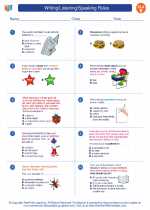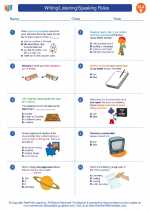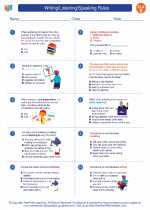Writing/Listening/Speaking Rules
Students read a wide range of print and nonprint texts to build an understanding of texts, of themselves, and of the cultures of the United States and the world.<br>Students participate as knowledgeable, reflective, creative, and critical members of a variety of literacy communities.<br>Students use spoken, written, and visual language to accomplish their own purposes.
◂English Language Arts Worksheets and Study Guides Fifth Grade. Writing/Listening/Speaking Rules
Worksheet/Answer key Writing/Listening/Speaking Rules
Writing/Listening/Speaking Rules  Worksheet/Answer key
Worksheet/Answer key Writing/Listening/Speaking Rules
Writing/Listening/Speaking Rules  Worksheet/Answer key
Worksheet/Answer key Writing/Listening/Speaking Rules
Writing/Listening/Speaking Rules 

 Worksheet/Answer key
Worksheet/Answer key
 Worksheet/Answer key
Worksheet/Answer key

The resources above cover the following skills:
Students read a wide range of print and nonprint texts to build an understanding of texts, of themselves, and of the cultures of the United States and the world; to acquire new information; to respond to the needs and demands of society and the workplace; and for personal fulfillment. Among these texts are fiction and nonfiction, classic and contemporary works. (NCTE)
Students adjust their use of spoken, written, and visual language (e.g., conventions, style, vocabulary) to communicate effectively with a variety of audiences and for different purposes. (NCTE)
Students employ a wide range of strategies as they write and use different writing process elements appropriately to communicate with different audiences for a variety of purposes. (NCTE)
Students participate as knowledgeable, reflective, creative, and critical members of a variety of literacy communities. (NCTE)
Students use spoken, written, and visual language to accomplish their own purposes (e.g., for learning, enjoyment, persuasion, and the exchange of information). (NCTE)